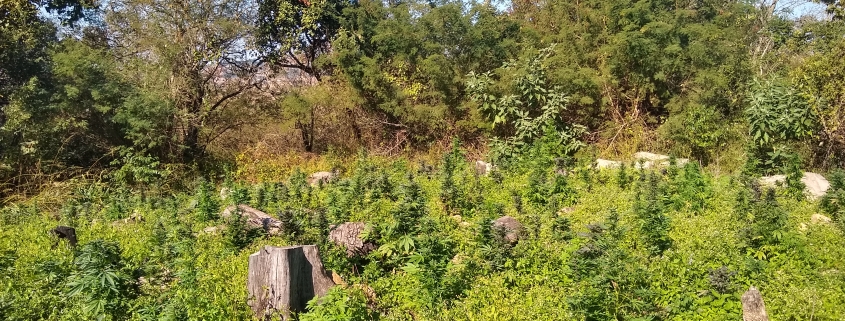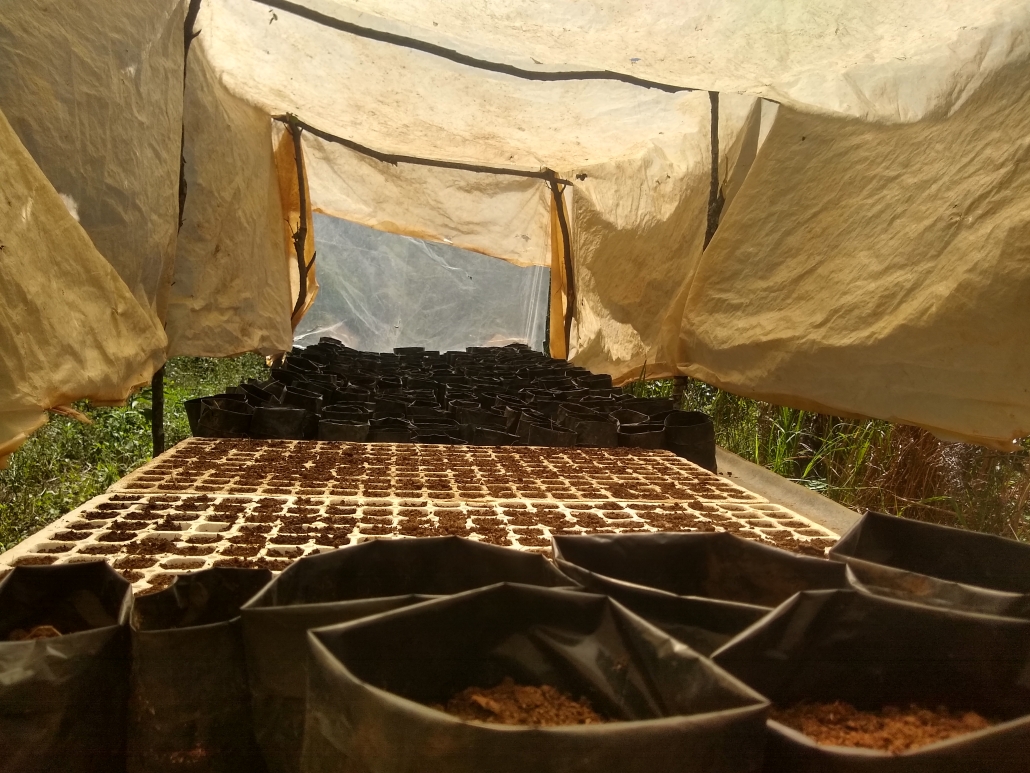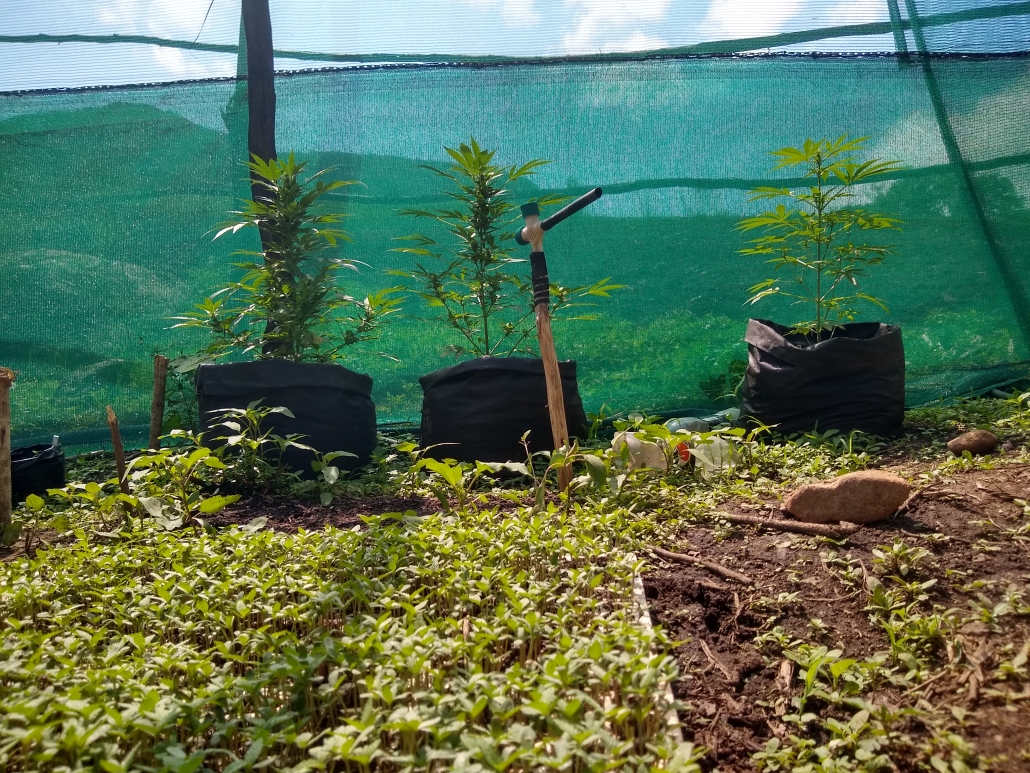Introduction: Partnering with a Local Farmer
Introduction: Partnering with a Local Farmer
Mgadlela Farm
Magedlela farm is located in the Hhohho region of Eswatini, in the Ntsieni community, it is a sort of middle veld area facing east towards the lowveld. The farm is small and operated by 1 person, as many are here, and consists of approximately 4 hectares of fields depending on the season and availability of good seeds. The number of ‘fields’ has increased gradually since 2019, and Hemp Nation’s addition of fencing and water pipes around the entire property has allowed more traditional agricultural crops to be added to the farm.
In this report, we cover 8 projects which were carried out with the farmer as a participant in our research. We are farming, in a research capacity, using organic fertiliser and developing outdoor soils and techniques with experimental seeds.
This chapter covers many projects overall in this report. In terms of the relationship with the farmer we encompass all activities.
Partnership Programme
Hemp Nation’s core principles include Agricultural Development, Research and Education. Because of this we take our impact on the lives of everyone we partner with very seriously. In this case it is a local farmer with a piece of land that has minimal development with only a small building and fields. The farm is a single family homestead which is operated in a subsistence capacity with the whole livelihood of the family dependent on the outcome of the harvest and successful sale of produce, namely cannabis.
This is a very typical situation all over Eswatini. Because of these ‘stereotypical’ characteristics Mgadlela is a perfect candidate for developing a working relationship which secures the future of the farmer and his family. Through working with hemp and diversification of farm practices, research in the Partnership Programme would have valuable outcomes for both parties in a long-term building capacity. Research and information flow will build a more holistic understanding of the future industry for the farm and a more complete understanding of the ongoing local situation.
Discussions have already begun with expanding Mgadlela’s role and starting a training programme whereby an apprentice is employed to learn to farm under the watchful eye of the head grower on the farm.
Aims and Objectives
The initial objective, in brief, was to create a mutually beneficial relationship with a farmer. Part of the research was to find out what the needs of local producers are, and how an incoming entity can be of assistance without ‘taking over’.
The first need identified was based around securing the crop, improving yield. We decided installation of proper fencing securing the property from marauding local goats and cows is the solution.
The second need identified was proper irrigation; many man-hours are spent moving pipes and sprinklers between fields and within fields.
The third need identified and ongoing project is around propagation and reducing losses in the first phase of growth.
The long term aims and objectives of this project for Hemp Nation also include; growing hemp, securing product knowledge that we have created for Hemp Nation to use, create our own strain and grow unique plants that we can use in the future, secure seed supply (our plants successfully grown have provided us with seed), and promote organic fertiliser and farming methods.
Supplies Provided to Farmer
| Equipment | Type of Spend | Comments |
| Fencing | 1st phase spend | Greenhouse Completed in June |
| Shade cloth | 1st phase spend | Greenhouse Completed in June |
| Water pipe | 1st phase spend | Greenhouse Completed in June |
| Timber Poles | 1st phase spend | Greenhouse Completed in June |
| Worm Tea/Manyolo | Ongoing cost | Nutrients plan has been diversified with fish manure, kelp extract and organic chicken wee |
| Water Testing Kit | equipment investment (once off) | Still to be completed, PH Soil tester on site |
| Scissors/Bags/Jars/
Labels/ |
Ongoing cost | Small amount was spent at the beginning, grow bags were traded, labels were recycled, jars were recycled |
Conclusion
In conclusion, the farm has benefited from upgrades and investment into basic infrastructure and continues to operate into the second year.
The investment has drastically improved life on the farm introducing seedling trays for all crops and allowing young plants a strong start in the greenhouse. Reports from seedling to field were very positive with few casualties and good growth after transplanting.
The greenhouse has helped enormously and the use of plastic sheets and bottles to create mini-greenhouses is producing good results. Improvements in plant consistency are being sought through the development of cloning knowledge.
Fencing provides protection from cattle allowing the farm to utilize space more effectively without fear of marauding local cows and goats.
Water pipes running through the farm have drastically improved irrigation capability spreading to all corners of the property.
Hemp Nation considers this project so far to have been a success despite stagnant legislation and other difficulties.
We have managed to exchange knowledge bilaterally. As described above with our success in fencing, irrigation and propagation; we believe the bulk of our aims were achieved and we look forward to the expansion of our impact in the coming year. This project is envisioned to be renewed annually for a minimum of two years, we will continue to assist the farmer in the following year (2022) with monthly stipends, equipment and shared knowledge programmes.
We have collected a surprisingly large amount of data through projects that we were able to run through this partnership. Pictures, videos and written records which we will use in the creation of educational material and research reports.







Leave a Reply
Want to join the discussion?Feel free to contribute!